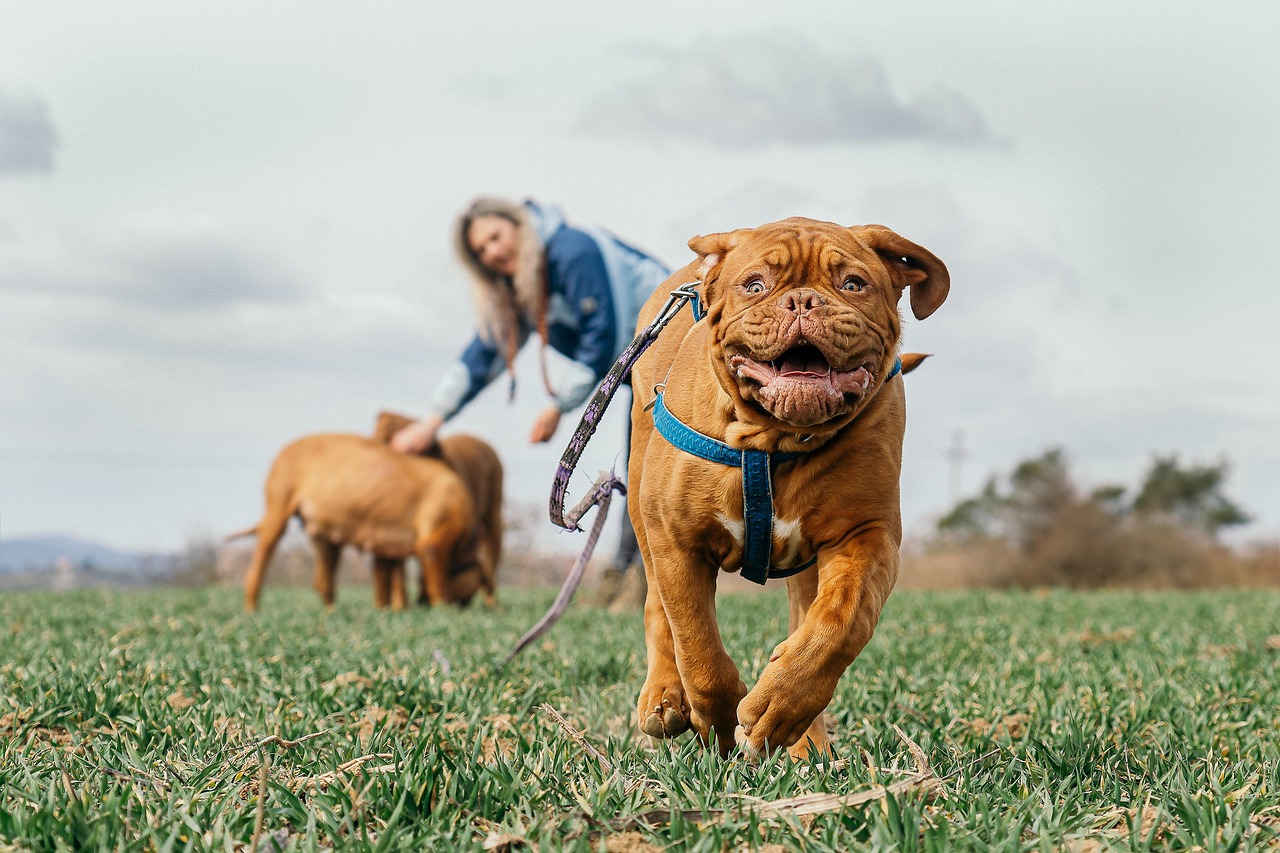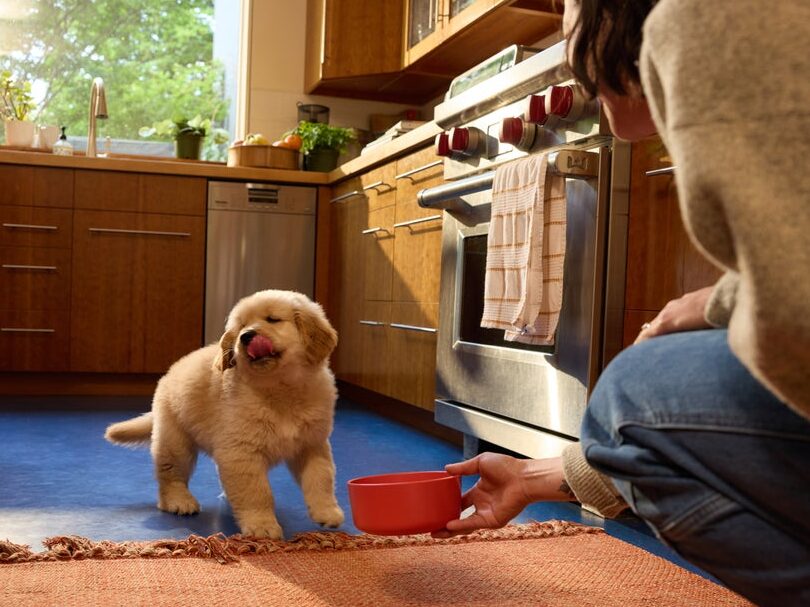Hey Ollie blog readers! We’re offering you an exclusive 60% OFF your starter box! Try now!
You might think that your dog’s life is a total walk in the park, literally and figuratively. It’s all sit for treats, snooze, repeat. But no matter how laid-back their days may seem, canines can experience their fair share of stress.
“All sorts of things can cause dogs to stress,” says Kayla Fratt, associate certified dog behavior consultant and CEO of Journey Dog Training in Denver. “Some of the most common are unexpected or unfamiliar noises, travel or changing schedules, fast movements from things like kids or bikes, and loud noises. Essentially anything unusual or unexpected, from your dog’s point of view, can be stressful.”
Part of a dog’s stress may stem from their breed, especially paired with certain environments. Dogs bred for herding and guard dogs, for example, are especially prone to being anxious in urban environments. On the flip side, dogs bred to be guide dogs tend to have extremely resilient temperaments. That being said, any dogs, regardless of type, can feel stress. “Breed is not the whole story,” says Fratt.
The good news is that dog stress often manifests itself in visible and audible cues that you can pick up on. Read on for signs your pup might be stressing, plus steps to take if you think he is.
What Makes Dogs Stress Out
Some of the same things that might cause a spike in your heart rate could also be stressing out your dog. Okay, not work deadlines so much, but things like worrying about where someone is and hearing loud noises (think unexpected honks or the sound of construction outside) could be culprits.
“In the city, especially in high-rise apartments or condos, we see a lot more anxiety around high-traffic times of day as people pass by the apartment door,” says Melissa McCue-McGrath, CPDT-KA, author of Considerations for the City Dog and co-training director of The New England Dog Training Club. Typical guard-dog breeds might be especially stressed by these urban noises.
No matter where you live, common things can cause your dog stress. These include sudden noises from thunderstorms or garbage trucks or just anticipating that their owners are going on vacation (a.k.a. separation anxiety). “Once you determine the kind of anxiety or stress your dog is suffering from, in many cases there can be a predictable schedule to prepare for and help a dog cope through those occurrences,” says McCue-McGrath.
7 Common stressors for pups
1. Being punished for behaving like an animal
If your dog is like most, he enjoys barking at the mailman, chewing on stuff, sniffing smelly things and digging in the trash. These behaviors can be frustrating for humans but the truth is, your dog is just being…a dog.
Of course, that doesn’t mean they should have free reign to do whatever they want whenever they want to. Rather than yelling at your pup or taking her toys away, practice positive reinforcement and set her up to succeed (i.e., don’t leave your favorite shoes out on the floor or the garbage can lid wide open). And remember, your dog isn’t acting out of spite, these behaviors come naturally to her and may be reinforced by your response.
2. Not having a regular schedule
Dogs love a routine. If you’re inconsistent,they might become stressed. If your pup isn’t fed regularly, hunger can turn into stress easily. This can lead to more problematic behaviors like resource guarding or demand barking. You also want to make sure your pup is getting enough sleep. Just like in humans, sleep depravation can cause stress and irritability. So, if you have to get up earlier than usual for a meeting, try to let your pup sleep as close to normal as possible.
3. Being hugged or smothered to death
After a long day at work, all you want is a big hug from your pup. Problem is, not all dogs like being hugged—in fact, the majority of vets and trainers say it’s contrary to their nature and can make them feel trapped and panicky (especially if the embrace is from a child or stranger). So while it’s fine to snuggle, try to do it in a non-constraining way: Petting and brushing are usually a good way to go.
4. Getting scolded with a shaking a finger
You might be tempted to raise your voice and stand over your pup with a shaking finger, but this stance is more likely to stress them out than actually fix the behavioral issue. Rather than take a dominating stance, use positive reinforcement to teach your dog good behavior.
5. Not getting enough exercise
Just like humans, dogs need to blow off steam sometimes, and exercise is a great way to do that. Giving your pup a regular workout will keep them fit, both physically and mentally, and ultimately lead to lower stress levels.
6. Sharing food with other dogs
Even the most playful pups don’t want to share at dinnertime. If you have more than one dog, be sure to give each dog their own bowl and feeding spot. The same goes for treats and chews like bully sticks or bones. To avoid fighting or stressing the pups out, make sure everyone has their own.
7. Going to the vet
Taking your dog to the vet can be downright traumatic for everyone. To make it easier on your pup, familiarize her with the vet ahead of time. Pop in to say hi the next time you’re on a walk—and take advantage of the free treats while you’re there so your dog associates the visit with a positive experience. If vet bills are a concern, consider enrolling in pet insurance so you’ll be prepared for unexpected accidents and illnesses.
What Stress Signals To Look For
“Just like with people, dogs can express stress in a variety of ways and degrees,” says McCue-McGrath. Some of the classic visual cues: crouching, pulling their ears back, tucking their tail, excessive blinking, shivering or trembling. Your pup might also pace or stand with one foot in the air, and if you can see the whites of her eyes easily, that’s another sign she’s anxious.
Many dogs will also “stress pant,” which can be hard to tell apart from normal panting at first, says Fratt. You’ll know the panting is likely stress-related if there isn’t a physical reason to be panting—for instance if your dog wasn’t just exercising and it’s not hot. “Any behavior that doesn’t make sense given the situation, like yawning repeatedly when nothing else is going on or lip licking when no food is present—may be a signal of stress,” says Fratt.

What to Listen For
Visual signals might be the first thing you notice when your dog is anxious, but those aren’t the only clues your canine’s offering; they’re likely also being vocal in different ways than usual. “Dogs are less vocal than us, but some dogs will make noises when they’re stressed,” says Fratt. Growling, whimpering, whining, or escalating from a whimper to full-on barking can all be audible signals that your dog isn’t relaxed.
There are a few physical and vocal cues that should serve as a warning to keep your distance from your dog (or other dogs you might come in contact with). Watch out for growling, if your dog moves toward the threat instead of running away, or if he stands stiffly while staring hard. “If you notice one of these more serious signs of stress, be careful as they might lead to a bite,” says McCue-McGrath.
When to Look and Listen for Stress
The time of day when dogs get stressed totally depends on the dog and what he’s anxious about. For instance, “Dogs that are sensitive to commotion outdoors might struggle during the morning commute or when people walk outside,” says Fratt. “Or dogs that get stressed by being alone will probably be most stressed mid-day.”
If your pup frequently seems bothered in the evening, it could be a symptom of a hormonal imbalance, says McCue-McGrath. In that case, a supplement might help him relax and wind down at the end of the day; consult your vet if you suspect that could be the problem.
What To Do If Your Dog Is Stressed
First of all, try to understand what seems to set your dog off. Once you’ve pinpointed stressors, you might be able to control your pup’s environment to eliminate the causes. If your dog gets startled by certain noises—like the mail or garbage truck coming up your driveway—turn on a fan, noise machine, or music when you know it will happen.
You might also try to flip the script so your dog will slowly start associating their stressors with happy feelings. To do so, “Reduce their triggers as much as possible, then slowly pair those triggers with good things,” advises Fratt. For instance, if your dog gets stressed around dogs he doesn’t know, try to avoid new dogs on walks and give your dog a treat whenever another dog passes by.
If your dog’s stress or anxiety seems unusually high, talk with your vet and see if medication or supplements might help. If meds aren’t the way to go, try working with a dog trainer or behavior consultant, suggests McCue-McGrath. Some resources for finding one near you: the Council of Certified Professional Dog Trainers or the International Association of Animal Behavior Consultants. A veterinary behaviorist might also help, especially in more extreme situations. “These are veterinarians who are board certified in animal behavior and can treat serious behavior problems including anxiety,” says McCue-McGrath; she recommends finding one at the American College of Veterinary Behaviorists.
The Ollie blog is devoted to helping pet parents lead healthier lives with their pups. If you want to learn more about our fresh, human-grade food, check out MyOllie.com.
Tagged As:

The nutrition your dog needs,
the food they want.

Enjoying our articles? Subscribe our Newsletters and get new articles directly to your inbox
You might also like
23 September 2025
6 MINS READ
Back to School: Training Your Dog at Any Age
As we hit back-to-school season rolls around, it’s not just kids who benefit from sharpening their skills and learning something new—our dogs can, too! Training isn’t limited to puppies or p…
by Ollie Pets
23 September 2025
7 MINS READ
Lace Up and Leash Up: A Beginner’s Guide to Running with Your Dog
Running is one of the simplest ways to stay active, and it’s even better with a canine companion. Not only does running with your dog keep you both in great shape, it also strengthens your bond …
by Ollie Pets
13 May 2025
8 MINS READ
Puppy Training Guide & Behavior Timeline
Bringing home a puppy is pure magic. It’s also pure chaos—tiny teeth, zoomies, accidents in the house, and moments that make you wonder if you’re raising a future genius or a tiny tornado. …
by Ollie Pets







